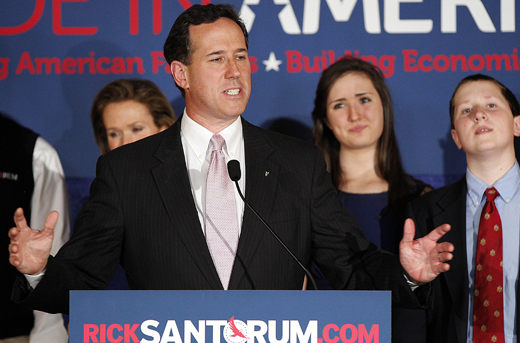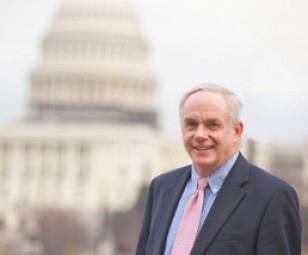Southern Sweep Portends Long Race

Rick Santorum celebrates after winning the Mississippi and Alabama Republican Party primaries. Photo: AP
So in the aftermath of Rick Santorum’s sweep of the primary election battles in the South, are we any closer to picking a Republican Party presidential nominee? Well, in one sense no, but in another, yes.
Santorum has got something Mitt Romney, the supposed front-runner, would love to have—solid support from base conservatives, Tea Party folks and evangelical Christians. But Romney has the delegate lead even after the Santorum victories in Alabama and Mississippi and continues his slow slog toward the nomination.

Mitt Romney falters in the South, but leads in the Republican delegate count that determines the nomination. Photo: AP
It’s true, Romney seems to be drifting toward his goal rather than seizing it. And it’s got to cause no small amount of angst among the Republican elite that he just can’t seem to close the deal.
Too many Republicans still want to vote with their heart, not their head, it appears, so the whole “Romney would be a better general election candidate” thing still seems to have limited appeal among the true conservative believers. Ever since the rise of the Tea Party in 2010 it was clear that activist conservatives were going to demand, above all else, an anti-Obama campaign from their nominee in 2012.
Well, they’ve held the auditions and after all the screaming, their preference for that role would be filled by Santorum.
So Romney gets beat in the southern states, or the smaller ones with large rural populations, and manages to eke out some victories in larger states where more moderate Republicans cluster in the suburbs near the larger cities.
Newt Gingrich staying in the race has helped Romney, splitting the conservative vote with Santorum in enough places to help Romney hold on for some nail-biting wins like in Ohio and Michigan.
So what happens if Gingrich finally leaves the race? That is what the Santorum crowd desperately wants to see if they can puncture the vaunted Romney regime even more. But it’s not a given that all the support for Gingrich would automatically transfer to Santorum.

Newt Gingrich falls short in his home region. Photo: AP
Santorum’s main problem is the lack of winner-take-all opportunities in the remaining primaries where he could make up some real ground in the delegate hunt against Romney. His best shot now is to slow down Romney enough to deny him the 1,144 delegates he needs before the party convention in Tampa in August. Then Santorum would hope for some sort of groundswell among conservatives to overturn the Romney parade float when the party faithful gather.
It’s a long shot, but the longer Romney struggles to close deal, if it’s his to close, the more the conservative doubters will squawk from the sidelines that a former Massachusetts governor once known as a moderate simply should not be the standard bearer for a party that wears its heart on its right sleeve.
I wonder when we get to the point where if Romney is not able to line up the necessary delegates before the convention, the rumors and speculation will begin about Romney cutting a deal with either Santorum or Gingrich to get enough delegates to get over the threshold. So which ticket sounds better—Romney-Santorum or Romney-Gingrich?
Obama’s Gas Problem
Obama supporters who have grown more confident of re-election in recent weeks have begun to notice an elephant over in one corner of the room in the shape of a giant gasoline pump.
Quick, name the one thing incumbent presidents hate? If you guessed THINGS OUT OF THEIR CONTROL, you win.
It was just a week or two ago that things were looking rosy for the Obama White House. The economy continued in uptick form, more jobs were being created each month and more people were looking for those jobs. Plus, the Republicans running for president were savaging each other on what appeared to be a “bridge to nowhere” and all of sudden, Democrats were feeling pretty good about themselves and starting to wonder just how big a re-election victory Mr. Obama could pull off.
But as gas prices edge above $4 a gallon and head for $5, you can forget about that. Look, most people have little use for politics until it affects them where they live — food prices, housing and the cost of fuel.
When things get bad they look to blame somebody in a hurry and they are probably not going to consult a spread sheet to apportion blame. It comes down to who’s on watch at any given time, and that happens to be the incumbent president.
And just in case we need to cite history here, consider the case of one James Earl Carter, the unlucky 39th President of the United States.
Yes, it was the Iran hostages and the economy in general that helped to do in Carter in 1979-1980, but one of the most searing images from the end of his presidency were the long lines at gasoline stations with people waiting to fill up. That is like the ultimate bad karma for any politician seeking re-election. If that slide showed up on a power point presentation for wannabe politicians, it would have a circle with a line through it with a disclaimer that reads, AVOID AT ALL COSTS.
So what can the president do about it? Not too much, really. Hope people cut back on their driving a bit and force the price down a bit or that the world market somehow eases at some point and the prices trickle back down a bit.
You can be sure they are tracking this stuff at the White House in very fine increments. Look at the recent polls and you’ll see why. The president’s approval rating has come down in two major polls recently, and it seems pretty clear there is a close correlation between rising gas prices and falling confidence in the president’s ability to handle the economy.

